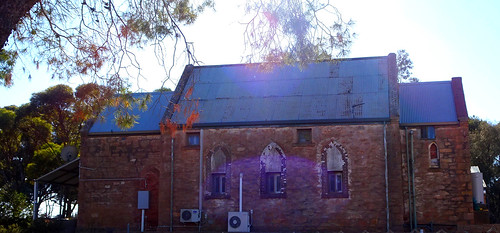Tarcowie. This Anglican Church was built in 1889. It has been a private residence for decades.

Image by denisbin
Tarcowie.
Tiny Tarcowie trapped in a time warp typifies township tenacity. Its eight residents cling to life in historic structures from the first decade of the town’s establishment. The Chambers brothers from 1844 and then Price Maurice from 1846 had pastoral leases over the district (671 square miles) until 1871 when the Hundred of Tarcowie (meaning place of washaway water) was resumed, surveyed and opened for selection in 1872. The township of Tarcowie was surveyed in 1875 with 190 town and 150 suburban blocks. Less than half were ever sold. The spot had been the Tarcowie outstation of the Pekina run. Tarcowie township soon had a Post Office, hotel (1878), school (1879), Anglican (1889) and Primitive Methodist (1879) churches, as well as a superb General Store (1878), butcher’s shop, saddlery, two blacksmiths and a wheelwright. An institute was mooted in 1881 but not erected until 1906. It closed as an Institute in 1961 and became a community hall. The nearest railhead was at Caltowie 28 kms away. Today the only buildings still functioning in the “town” are the community hall when needed, and the first school which is now the Golf Club Rooms. The second schoolroom opened in 1929 and closed in 1961. The residents cling on in the two churches, the hotel etc. The most occupied part of town is the cemetery! The hotel closed in2008 and re-opened in January 2024. The community hall, formerly the Institute is still in use for public functions and mail is delivered three times a week.
One early family was the Stagg family and William Stagg who kept an annual diary all of his life wrote a book on his teen years of 1885 to 1887. It was compiled and published by Nancy Robinson. (Stagg of Tarcowie: the diaries of a colonial teenager 1885-87. Lynton publishers Adelaide 1973.) Here are just a few extracts and précis: ” William noted that after eleven years on the farm they had decided to erect a water closet.” There was no need before as there were plenty of trees!” He and his father visited Teetulpa goldfields out from Peterborough which he described as “wretched country unlike Tarcowie”. “Another year has fled, one less to live.” “Spent New Year’s Day reaping; took 21 bags of wheat to Caltowie”. “I am really vexed to think I failed again to keep my tongue from bad language”. William Stagg was born in 1867 and died in Adelaide in 1944. He married in 1909. Family names in the Tarcowie cemetery from the early years include : Butterick; Dempster; Hortin; Kotz; Lemm; Liebich; Lines; Ninnes; Pfeiffer; Smith; Stagg; Willsdon.


